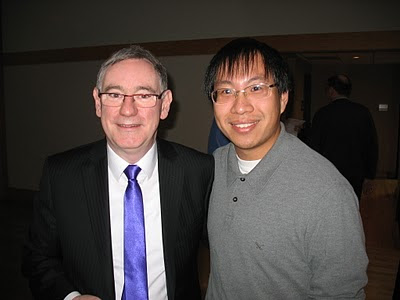Geminiani : Concerto Grosso in C major, after Corelli Violin Sonata Op.5-3
Vivaldi : Concerto in D minor for 2 violins and cello, Op.3-11
Corelli : Concerto Grosso in F major, Op.6-12
Handel : Concerto in F major for Organ and Strings, "The Cuckoo and the Nightingale"
Locatelli : Concerto Grosso in B flat major, Op.1-3
Davitt Moroney
Archetti是舊金山灣區當地剛成立的巴洛克樂團,由當地有名的古樂音樂家所組成的。這些音樂家,平時除了授課,也是其他的古樂團的成員,像是前幾天去聽的Philharmonia Baroque,還有American Bach Soloists等。當初他們成立的目的,我原先也搞不大清楚,倒底是為了多撈點錢,還是有別的音樂表演上的理念?
看節目單上的介紹,Archetti,選擇採一聲部由一人演出,可達到更有凝聚力的聲音。前幾天去聽的Philharmonia Baroque樂團,團員多,每位投入的時間和心力不同,使得每次的演出水準有好有壞。而且,古樂團,絃樂聲部頂多三,四人,如果出點小紕漏,很容易就聽得出來。Archetti,每一位都已經是自己樂器的專家,而且要一人撐起一個聲部,得更敬業,完全不能有任何懈怠。他們的曲目大部份為巴洛克時期的協奏曲,就連Corelli和Handel的大協奏曲集需要的七(八)聲部,也能演奏。這分別為獨奏樂器群(concertino)的第一小提琴,第二小提琴,還有大提琴, 以及合奏群(ripieno)的第一小提琴,第二小提琴,中提琴,還有數字低音(通常由 低音大提琴 + 大鍵琴 / 風琴/ 別的可以彈合絃的樂器,如lute,theorbo,或吉他)。
Archetti的現場表現,整體素質非常好。樂句處理,大小聲變化,還有節奏的控制,都是很有音樂性的。Archetti和德國許多古樂團那種陽剛的聲音,或是義大利那種狂野的拉法是不同的,是比較收斂,但絕不無聊。前兩首Handel和Geminiani的大協奏曲,都是迎合大眾的曲風的曲子,但更重要的,當初他們在英國寫這些曲子的時候,考慮到音樂家的程度,都沒有寫得太難。中場前的Vivaldi協奏曲,則是完全不同,兩把小提琴和大提琴都有困難的獨奏橋段,目的就是大方地秀炫技,迷倒聽眾。我已許久沒有聽到這一首了,不過經再次聽到,也使我再次認清Vivaldi曲子能夠吸引人之處。
chamber organ
下半場有一首Handel的風琴協奏曲,使彈數字低音伴奏的國際知名大師Davitt Moroney得以施展一下他的鍵盤技巧,不然就有點大材小用了。跟之前介紹過的韓德爾作品四風琴協奏曲一樣,這首協奏曲目的是給室內小風琴用的,而不是教堂的大管風琴,不然音量會太大,蓋過樂團。這次用的風琴,是專門從Berkeley運下來的~~
這是中場休息時,調音師在調音。風琴底下有插電,因為送風已改電力風扇,無需人工親自去踩了 :)
下面這張才是教堂內比較大的管風琴,作禮拜時會彈的。
風琴協奏曲有個暱稱,叫「布穀鳥與夜鶯」,因為第二樂章那個「布穀」的旋律。模仿鳥叫聲在巴洛克時到處都有,所以韓德爾這首不能算是有創意。而且,這個快樂章,在他作品六大協奏曲裡第九號也有出現過,不枉韓德爾為作曲家「回收第一名」的稱號~
Davitt Moroney是國際有名的學者,同是一位鍵盤師。老實說,他在學術方面的貢獻,更值得稱讚,因為經過他的研究,得以將許多幾百年來不見天日的譜,重新挖了出來,並重新編成現代版樂譜,讓世人可更容易取得這些音樂。不過,做於學者,他的彈法也充滿了一種學者派的氣息,比較偏中規中矩的路線,挑不出嚴重的毛病,但也留不下極深的印象。我猜想,這是一種做為學者,會想採取較中立,較不願意注入太多自己風格的做風。不過,我有許多Davitt的錄音,是有很多可欣賞的地方。他在簽我的CD時,非常友善,也很大方。聽到我也是業餘的大鍵琴家以及我的老師時,也很高興。
下半場另外兩相是Corelli和Locatelli的大協奏曲。Corelli是大協奏曲的始祖,不用再多說。而Locatelli,有巴洛克帕格尼尼之稱,當初會寫出作品一的大協奏曲和作品二的長笛奏鳴曲,其實有時讓人費解。可以說,這兩套是讓Locatelli小試身手的音樂。Locatelli的大協奏曲,依照著前輩Corelli的模式而寫,裡面沒有什麼太驚人的地方,不過concertino第一小提琴不時有幾段比較花俏的地方,難以掩飾他想寫獨奏小提琴協奏曲的野心。Carla Moore身為concertino第一小提琴,拉起來神情自若,獨當一面。
整個音樂會在很歡愉的氣氛下結束。雖然這些曲子都是我非常熟悉的,所以少了那種聽到新曲子的意外驚喜感,但Archetti現場的高水準表演,讓我印象很深刻。未來的音樂會,我一定會再來支持的。
That's a lot of concertos for a 2-hour afternoon. However, this has also been one of the concerts where I have been more than familiar with all the pieces being played. I used to have a thing for collecting concerti grossi (still do), so it is one of my most well-known Baroque musical genres.
Archetti Baroque String Ensemble is a newly formed group in the SF Bay area, started in the spring of 2009. Most of the members are leading early music specialists in their own right, performing and teaching in the Bay Area. To name a few, John Dornenburg on the viola da gamba, Carla Moore and Kati Kyme on the violin, and Davitt Moroney on the harpsichord/organ. Many of these players are also already in other early music ensembles (Philharmonia Baroque, American Bach Soloists, etc), so it begs the question, with so many existing period groups here, what is the nature of this ensemble? On the pamphlet, it describes the Archetti (Are - Keh - Tee) as being able to specialize on violin concerti and concerti grossi of the German/Italian composers, and with a smaller group, able to bring about a cohesive and dynamic sound.
I think that is pretty true. Being the leading specialists in their instruments and employing one instrument per part, Archetti's playing was fresh and polished. Oftentimes, with a Philharmonia Baroque (PBO) concert, many of the string players aren't quite on top of their game. With a small ensemble, when you have a number of 3 or 4 instruments per part, a minor slip-up has a much more noticeable effect on the sound. So, the Archetti played very well. You don't get the robust German sound or the gutsy Italian playing, but this is very good playing in their own right: nice phrasing and articulation, and good dynamics contrasts and other musical inflections, allowing the music to flow and breathe smoothly yet vibrantly. The piece that took me by surprise was the Vivaldi concerto, where violinist Carla Moore dazzles us with her skills. It was a very exciting rendering, and made me realize (once again) how a good Vivaldi concerto can wow your audience. You can find more of her playing if you search for the group "Voices of Music" on youtube.
Davitt Moroney, world renowned scholar and keyboardist, played the chamber organ, something I got to see for the first time. However, he was given his spotlight when he played the most famous Handel organ concerto "The Cuckoo and the Nightingale." It was a fine performance, as his handled the cuckoo motif musically, pausing after the first brief introduction, and then proceeding to roll in the music. Between the 2nd and 3rd movement, there was an ad libitum section, where his improvisation starts out with the cuckoo theme, but morphs into a slow passage with long chords in harmonic progression, ultimately leading up to the opening of the slow movement. His overall playing was absolutely solid, yet the impression of a scholarly interpretation nonetheless seeps through. He probably refrains from any type of extreme performance, a route he is consistent with.
The last concerto was the Locatelli concerto grosso, first time I got to hear one of his concerto grosso performed live. Locatelli's music has been associated with that written for a virtuoso, and the emphasis on the first violin of the concertino group illustrates this fact. Impressed to the end, they played the last movement of the Vivaldi concerto again as the encore piece. I look forward to their future concerts.
During intermission, I also had a chance to talk to Mr. Moroney and have him autograph the few CDs I have of him. One of his most impressive recording feats has got to be the complete keyboard works of William Byrd, a challenge on many levels he had to go through.




雖然應該貼在你介紹四季那篇,但貼在這裡回頭找容易多了.
ReplyDelete我們昨天去聽的音樂會上半場是四季,用的是大鍵琴(果然是巴洛克音樂). 我很好奇,現在市面上的錄音,四季也都是用大鍵琴嗎? 還是有改用鋼琴的?
ps/昨天第一次現場看到魯特琴!
一般市面上的錄音基本上都會用大鍵琴。像Joshua Bell在錄的時候,也是一樣。
ReplyDelete如果是一般高中表演沒有大鍵琴,低音的部份可能就只交給double bass了,不過就只能拉單音,沒有和絃。